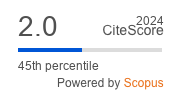Prototyping the future of learning: reflections after seven iterations of Challenge-Based Innovation (2014-2020)
DOI:
https://doi.org/10.23726/cij.2021.1290Keywords:
Challenge-driven education; experiential learning; design thinking; future of teaching creativity, innovation and entrepreneurship.Abstract
This article presents the reflections of a multidisciplinary team working on CERN’s Challenge-Based Innovation (CBI) since 2014. These reflections on pedagogy and innovation are positioned at the intersection of experiential learning, design thinking and challenge-driven education. Drawing from seven editions of what has become “CBI Fusion Point,” we present our story as an ongoing journey of experimentation with various formats and methods in response to broader shifts in education. Our article contributes to a better understanding of the characteristics and challenges that CBI-like programs pose and the infrastructure and support that they require.
References
Beckman, S. L. & Barry, M., 2007, Innovation as a learning process: embedding design thinking. California Management Review, 50(1): pp. 25-56, https://doi.org/10.2307/41166415
Charosky, G., Hassi, L., Leveratto, L., Papageorgiou, K., Ramos, J., Bragos, R., 2018a. Education for innovation: engineering, management and design multidisciplinary teams of students tackling complex societal problems through Design Thinking, in: 4th International Conference on Higher Education Advances (HEAD’18). Presented at the 4th International Conference on Higher Education Advances (HEAD’18), Editorial Universitat Politècnica de València, pp. 1081–1087. https://doi.org/10.4995/HEAD18.2018.8150
Charosky, G., Leveratto, L., Hassi, L., Papageorgiou, K., Ramos-Castro, J., Bragós, R., 2018b. Challenge based education: an approach to innovation through multidisciplinary teams of students using Design Thinking, in: 2018 XIII Technologies Applied to Electronics Teaching Conference (TAEE). Presented at the 2018 XIII Technologies Applied to Electronics Teaching Conference (TAEE), pp. 1–8. https://doi.org/10.1109/TAEE.2018.8476051
Christensen, C. M. & Eyring, H. J., 2011, The Innovative University: Changing the DNA of Higher Education from the Inside Out, Jossey-Bass.
Clifford, J. & Marcus, G. E., 1986, Writing Culture, University of California Press.
Etzkowitz, H., 2003, Research groups as “quasi-firms”: The invention of the entrepreneurial university. Research Policy, 32(1): pp. 109-121, https://doi.org/10.1016/S0048-7333(02)00009-4
Fairfield, T. & Charman, A., 2019, A Dialogue with the Data: The Bayesian Foundations of Iterative Research in Qualitative Social Science, Perspectives on Politics, 17(1): pp. 154-165. https://doi.org/10.1017/S1537592718002177
Geertz, C., 1977, The Interpretation of Cultures: Selected essays, Basic Books Classics.
Glen, R., Suciu, C. & Baughn, C., 2014, The Need for Design Thinking in Business Schools, Academy of Management Learning & Education, 13(4): pp. 653-667, https://doi.org/10.5465/amle.2012.0308
Hassi, L., Ramos-Castro, J., Leveratto, L., Kurikka, J.J., Charosky, G., Utriainen, T.M., Bragós, R., Nordberg, M., 2016. Mixing design, management and engineering students in challenge-based projects, in: Proceedings of the 12th International CDIO Conference.
Kolb, A. & Kolb, D., 2017, Experiential Learning Theory as a Guide for Experiential Educators in Higher Education, Experiential Learning & Teaching in Higher Education, 1(1), Article 7.
Malinowski, B., 1922, Argonauts of the Western Pacific, Routledge.
Micheli, P., Wilner, S. J. S., Bhatti, S. H., Mura, M. & Beverland, M. B., 2019, Doing Design Thinking: Conceptual Review, Synthesis, and Research Agenda, Journal of Product Innovation Management, 36(2): pp. 124-148, https://doi.org/10.1111/jpim.12466
Mulgan, G., Townsley, O. & Price, A., 2016, The challenge-driven university: how real-life problems can fuel learning, Nesta. Availabe at: https://media.nesta.org.uk/documents/the_challenge-driven_university.pdf
Otto, T. & Smith, R. C., 2013, Design Anthropology: A Distinct Style of Knowing, In Gunn, W., Otto, T. & Smith, R. C. (Eds.), Design anthropology: Theory and practice, Bloomsbury Academic.
Papageorgiou, K. & Kokshagina, O., nd, Envisioning the Future of Learning for Creativity, Innovation and Entrepreneurship, De Gruyter.
Robinson, K. & Aronica, L., 2015, Creative Schools: The Grassroots Revolution That’s Transforming Education, Penguin USA.
Srivastava, P. & Hopwood, N., 2009, A Practical Iterative Framework for Qualitative Data Analysis, International Journal of Qualitative Methods, 8(1): pp. 76-84, https://doi.org/10.1177/160940690900800107
Suchman, L. 2011, Anthropological Relocations and the Limits of Design, Annual Review of Anthropology, 40(1): pp. 1-18, https://doi.org/10.1146/annurev.anthro.041608.105640
Van Maanen, J. 2011, Ethnography as Work: Some Rules of Engagement, Journal of Management Studies, 48(1): pp. 218-234, https://doi.org/10.1111/j.1467-6486.2010.00980.x
Watson, T. J. 2011, Ethnography, Reality, and Truth: The Vital Need for Studies of ‘How Things Work’ in Organizations and Management, Journal of Management Studies, 48(1): pp. 202-217, https://doi.org/10.1111/j.1467-6486.2010.00979.x
Downloads
Published
How to Cite
Issue
Section
Categories
License
Copyright (c) 2021 Kyriaki Papageorgiou, Lotta Hassi, Ramon Bragos , Guido Charosky, Luciana Leveratoo, Juan Ramos

This work is licensed under a Creative Commons Attribution 4.0 International License.
Authors who publish with this journal agree to the following terms:
- Authors retain copyright and grant the journal right of first publication with the work simultaneously licensed under a Creative Commons Attribution License that allows others to share the work with an acknowledgement of the work's authorship and initial publication in this journal.
- Authors are able to enter into separate, additional contractual arrangements for the non-exclusive distribution of the journal's published version of the work (e.g., post it to an institutional repository or publish it in a book), with an acknowledgement of its initial publication in this journal.
- Authors are permitted and encouraged to post their work online (e.g., in institutional repositories or on their website) prior to and during the submission process, as it can lead to productive exchanges, as well as earlier and greater citation of published work (See The Effect of Open Access).


